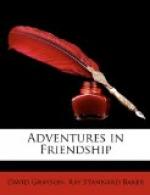“Here’s the grip of fellowship.”
He returned it with a will, but afterward he said doubtfully.
“I didn’t feel the grip.”
“Didn’t you?” I asked. “Well, Brother, it was all there.”
“If ever I can do anything for you,” he said, “just you let me know. Name’s Forbes, Spring Brook.”
And so he drove away.
“A real Mason,” I said to myself, “could not have had any better advantage of his society at this moment than I. I walked right into it without a grip or a pass. And benefits have also been distributed.”
As I drove onward I felt as though anything might happen to me before I got home. I know now exactly how all old knights, all voyageurs, all crusaders, all poets in new places, must have felt! I looked out at every turn of the road; and, finally, after I had grown almost discouraged of encountering further adventure I saw a man walking in the road ahead of me. He was much bent over, and carried on his back a bag.
When he heard me coming he stepped out of the road and stood silent, saving every unnecessary motion, as a weary man will. He neither looked around nor spoke, but waited for me to go by. He was weary past expectation. I stopped the mare.
“Get in, Brother,” I said; “I am going your way.”
He looked at me doubtfully; then, as I moved to one side, he let his bag roll off his back into his arms. I could see the swollen veins of his neck; his face had the drawn look of the man who bears burdens.
“Pretty heavy for your buggy,” he remarked.
“Heavier for you,” I replied.
So he put the bag in the back of my buggy and stepped in beside me diffidently.
“Pull up the lap robe,” I said, “and be comfortable.”
“Well, sir, I’m glad of a lift,” he remarked. “A bag of seed wheat is about all a man wants to carry for four miles.”
“Aren’t you the man who has taken the old Rucker farm?” I asked.
“I’m that man.”
“I’ve been intending to drop in and see you,” I said.
“Have you?” he asked eagerly.
“Yes,” I said. “I live just across the hills from you, and I had a notion that we ought to be neighbourly—seeing that we belong to the same society.”
His face, which had worn a look of set discouragement (he didn’t know beforehand what the Rucker place was like!), had brightened up, but when I spoke of the society it clouded again.
“You must be mistaken,” he said. “I’m not a Mason!”
“No more am I,” I said.
“Nor an Oddfellow.”
“Nor I.”
As I looked at the man I seemed to know all about him. Some people come to us like that, all at once, opening out to some unsuspected key. His face bore not a few marks of refinement, though work and discouragement had done their best to obliterate them; his nose was thin and high, his eye was blue, too blue, and his chin somehow did not go with the Rucker farm. I knew! A man who in his time had seen many an open door, but who had found them all closed when he attempted to enter! If any one ever needed the benefits of my fraternity, he was that man.




